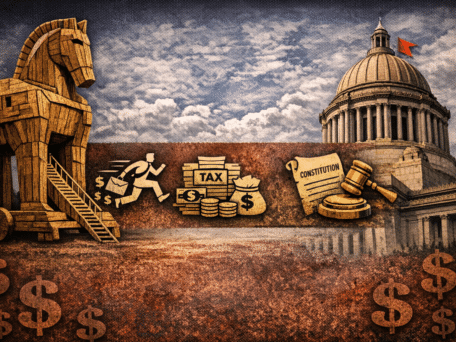The Washington State Supreme Court has once again thumbed its collective nose at the voters of our state. This time, the “Liberal 7” unanimously ruled that Initiative 1366 is unconstitutional – and considering the lock-step political viewpoint of all seven justices who preside on the court, the ruling is not surprising.
It was just too much for the lefties who occupy the court to allow the people to try and make it harder for legislators to raise taxes. Recall that the voter-approved I-1366 proposed a one percent cut in the sales tax unless the state Legislature allowed a public vote on an amendment that would require a two-thirds supermajority for future tax increases.
The ruling stated (via the Washington Policy Center):
“We affirm the trial court and hold that I -1366 violates the single-subject rule of article II, section 19, and that it is void in its entirety . . . We also hold that 1-1366 contains two operative, unrelated provisions and does not constitute valid contingent legislation. Thus, we hold that 1-1366 violates the single-subject rule and that it is void in its entirety.”
It should be noted that a survey conducted in December found an overwhelming 65% of respondents believe legislators should give voters a chance to weigh in and vote on a constitutional amendment.
The passage of I-1366 is by no means the first time voters have approved requiring a 2/3 legislative vote to raise taxes. The public has had their say a whopping six times on the subject, and here’s the record:
- 1993: Initiative 601 – passed with 51% yes vote, to require a 2/3rds vote in the legislature to raise taxes;
- 1998: Referendum 49 – passed with 57% yes vote (affirmed 2/3rd requirement);
- 2007: Initiative 960 – passed with 51% yes vote (re-enacted 2/3rd requirement);
- 2010: Initiative 1053 – passed with 64% yes vote (re-enacted 2/3rd requirement);
- 2012: Initiative 1185 – passed statewide with 64% yes vote, approved in 44 of the state’s 49 legislative districts, to re-enact the 2/3 requirement.
Notably, 17 other states provide taxpayers supermajority protection against tax increases. These states include Oregon (3/5), California (2/3), and Colorado (voter approval for all taxes). Perhaps the most hypocritical aspect of the Left’s opposition is the fact that several of the loudest voices against the initiative – such as the bosses of Washington’s public employee unions – also protect their members from bad policies with supermajority restrictions in their own constitutions.
Additionally, as the Washington Policy Center’s Jason Mercier points out, Washington’s constitution contains nearly two-dozen supermajority requirements. The Washington Policy Center:
“Among the 20 plus supermajority requirements are a 3/5 vote for spending money from the Budget Stabilization Account and 3/5 vote for issuing bonds. The one component currently missing from the state constitution’s fiscal supermajority requirements is additional protection for state taxpayers on tax increases. Ultimately, the legislature should allow the voters to harmonize the existing budget supermajority vote requirements with a tax restriction to complement the current higher threshold required for local tax-levy increases, incurring debt and spending one-time savings.”
The only way the will of the voters will be respected is if the state Legislature passes a constitutional amendment creating a supermajority requirement or voter approval for tax increases. Unfortunately, if Democrats continue to control either House of the legislature, or governor’s office, that won’t happen.
At every opportunity, House Democrats blocked the possibility of bringing a bill that would establish a voter-approved supermajority vote to raise taxes. But, if the 2016 elections have anything to do with it, the obstacle Democrats represent in the House could be removed.
Interestingly enough, there are 20 Democrat House members who represent districts that supported I-1366 in 2015. Four of those districts have split representation in the House, one Republican and one Democrat, making those Democrats extra-tempting campaign targets for the GOP.
Democrat incumbents running for re-election in these districts include first-termer Christine Kilduff (28th District, in Pierce County) and Democrat House Majority Leader Pat Sullivan (47th District, King County). The other two target districts – the 31st, straddling King and Pierce County and the 44th in Snohomish County, will feature open-seat contests since the incumbent Democrats likely read the writing on the wall, and have moved on.
There is no doubt that if Democrats maintain their hold on the state House that they will continue to do everything in their power to prevent the voters’ will on a supermajority requirement from ever coming to fruition. After all, as their party’s “guiding principle,” Democrats won’t ever allow anything to stand between them and raising your taxes… or imposing a future state income tax.




